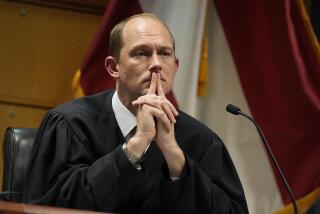Keating Trial Judge Dismisses 2 Counts, Keeps Remaining 18 : Thrifts: Lawyers for the former Lincoln Savings boss must begin his defense Thursday or turn the case over to the jury without calling any witnesses.
The judge presiding over the securities fraud trial of Charles H. Keating Jr. dismissed two criminal counts Tuesday but rejected a strong plea by Keating’s defense lawyer to throw out the remaining 18 counts.
Los Angeles Superior Court Judge Lance A. Ito refused to take the case out of the jury’s hands, forcing the former chairman of American Continental Corp. to put on his defense starting Thursday afternoon--or turn the case over to the jury without calling any witnesses.
Ruling a day after the prosecution rested its case, Ito said that for the case to continue there only needed to be slight evidence linking Keating, 67, to the alleged deception of small investors who bought bonds at Lincoln branches.
But he pointed out that his decision was based, as the law requires, on a view of evidence that is most favorable to the prosecution. That, he said, is a “relatively low” burden of proof.
Jurors, however, must base any guilty verdict on proof beyond a reasonable doubt, noted defense attorney Stephen C. Neal.
Ito did dismiss two counts on the prosecution’s motion because bondholders were too sick to testify. He also dismissed part of a third because the prosecution decided that it had not proved those points.
Thousands of customers bought more than $250 million in his company’s bonds at the Southern California branches of the company’s main subsidiary, Irvine-based Lincoln Savings & Loan. They lost their investments when Keating’s financial empire collapsed in April, 1989.
The charges he now faces, however, accuse him in 18 counts of defrauding 20 bondholders.
Ito found that given Keating’s “motive” and the deteriorating condition of his company, “there is sufficient evidence connecting Mr. Keating to these charges” without the testimony of so-called accomplices, including former Lincoln executives Ray C. Fidel and Robin S. Symes. Both pleaded guilty to six fraud counts and testified against Keating in a plea bargain.
The judge also found that all the evidence thus far presented provided “sufficient conduct” that could lead a reasonable juror to convict Keating of failing to disclose material information to small investors.
Deputy Dist. Atty. Paul Turley said the prosecution team was “vindicated” by Ito’s ruling.
Courtroom observers had anticipated that, based mainly on Fidel’s testimony that he began to feel uncomfortable about bond sales starting in the fall of 1988, Ito might dismiss nine counts.
More to Read
Inside the business of entertainment
The Wide Shot brings you news, analysis and insights on everything from streaming wars to production — and what it all means for the future.
You may occasionally receive promotional content from the Los Angeles Times.








